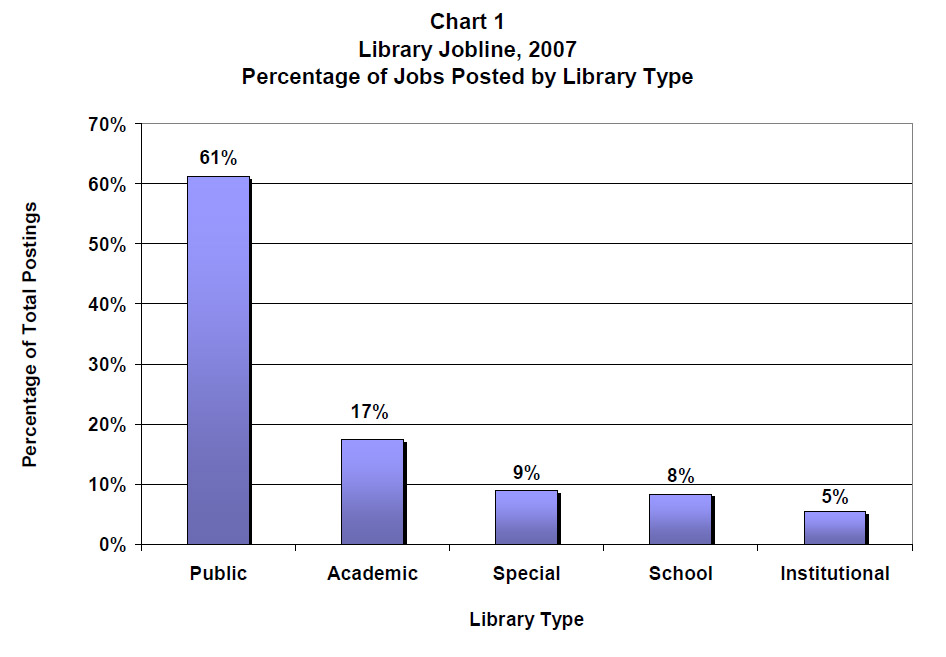In January 2008 the Colorado State Library Jobline celebrated its first anniversary at its new home, www.LibraryJobline.org. The new Library Jobline, unlike the original website, is database driven and gathers detailed information about job postings. This new interface allows both employers and job seekers to customize their use of the site. In addition, it allows for the compilation of data about job vacancies, including number of postings, library type, educational requirements, and reason for the position vacancy. This report examines some of this data based on the 552 jobs posted to Library Jobline in 2007.
Features of LibraryJobline.org
- Customizable email & RSS notification of new jobs
- Searchable job postings (current and archives)
- Map of job locations
- Hot Jobs – list of the most viewed posts
Jobs by Type of Library
Of all library types, public libraries posted the most job openings on Library Jobline with nearly 2 out of 3 listings (61%). This is not particularly surprising, given that public libraries employ more staff than any other library type.[note]Library Research Service. Big Facts about Colorado Libraries. http://www.lrs.org/documents/bigfacts.pdf.[/note] Academic libraries were a distant second with fewer than 1 in 5 of the jobs posted (17%), followed by special (9%), school (8%), and institutional (5%) libraries. Seven postings indicated more than one library type (see Chart 1).
Postings from school libraries comprised a smaller percentage (8%) on Jobline than public, academic, or special libraries, in spite of being the second largest employer of library staff. This relatively low proportion can be attributed to school library postings being more likely to include multiple positions in one listing and school districts’ tendency to post job vacancies internally or on school job websites (e.g., TeachinColorado.org). Nevertheless, school library positions are some of the most searched on the Jobline. As of this writing, the most viewed job post in 2008 was for a Teacher-Librarian position at Denver Public Schools.[note]2Library Jobline. Hot Jobs. http://www.libraryjobline.org/stats/hotposts.php.[/note]
Jobs by MLS Degree Requirements
A master’s degree was required at varying levels among different library types. Public, school, and special libraries required an ALA-accredited MLS degree for about one-third of the jobs they posted. Academic libraries required the degree most frequently, with nearly half of positions posted indicating the degree was required. However, special and public libraries were much more likely to prefer an MLS degree than were academic libraries. For all 3 of these library types, more than half of the jobs posted either required or preferred a master’s degree (see Chart 2).
When listing jobs, school libraries were given the option of “MLS required,” but not the option of “preferred education” because of the unique educational and licensing requirements for endorsed “school librarian” and “teacher-librarian” positions. These positions require a Colorado Department of Education school library endorsement, which includes a teacher license as well as a library science education.[note]Colorado Department of Education. Guidelines for Library Endorsement, Professional Education Path. http://www.cde.state.co.us/cdelib/download/pdf/Flowchart.pdf.[/note]
Reason for Vacancies
Employers posting to Library Jobline were asked the reason for the job vacancy. Of those who responded to this query, nearly half said the opening was created by a resignation (46%). Far fewer indicated they were trying to fill openings created by promotions (17%) or due to retirements (12%). A surprising and heartening 1 in 4 jobs listed were new positions (25%). Such a high rate of new openings suggests a continued demand for librarians in the Internet age (see Chart 3).
New Jobs and Spanish-Language Skills
Spanish-language skills were important in new positions posted on Library Jobline. A third of new jobs indicated a preference for such abilities (33%). This contrasts with a preference for Spanish skills in 1 out of 5 vacancies for existing jobs (20%). Given the changing demographics of Colorado, this increased demand to serve the Spanish-speaking public makes sense. The U.S. Census Bureau’s 2006 American Community Survey indicates that the number of Spanish-speaking Coloradans age 5 and older jumped from 363,723 in 2000 to 545,112 in 2006, an increase of 50 percent.[note]U.S. Census Bureau. 2000 Census Summary: Table PCT11: Language Spoken At Home By Ability To Speak English For The Population 5 Years And Over. http://factfinder.census.gov/servlet/DTTable?_bm=y&-context=dt&-ds_name=DEC_2000_SF3_U&-CONTEXT=dt&-mt_name=DEC_2000_SF3_U_PCT011&-tree_id=4001&-redoLog=true&-all_geo_types=N&-geo_id=04000US08&-search_results=01000US&-format=&-_lang=en & American Community Survey: Table C16001: Language Spoken At Home For The Population 5 Years And Over – Universe: Population 5 Years And Over. http://factfinder.census.gov/servlet/DTTable?_bm=y&-context=dt&-ds_name=ACS_2006_EST_G00_&-CONTEXT=dt&-mt_name=ACS_2006_EST_G2000_C16001&-tree_id=306&-geo_id=04000US08&-search_results=01000US&-format=&-_lang=en.[/note]
Library Workforce Trends
The first year of the new Colorado State Library Jobline gives us a brief glimpse into the types of jobs being posted for library staff. Notably, there continue to be new jobs created in the field, a master’s degree still seems to be relevant, and the desire for Spanish-speaking employees appears to be desirable in new positions. The real power of the new Jobline site, though, lies a few years down the road. As we harvest more information over time we will be able to follow trends in the job market and view a more complete picture of how the library workforce landscape is changing.
For more information on posting a job or viewing current job openings, see www.LibraryJobline.org.


